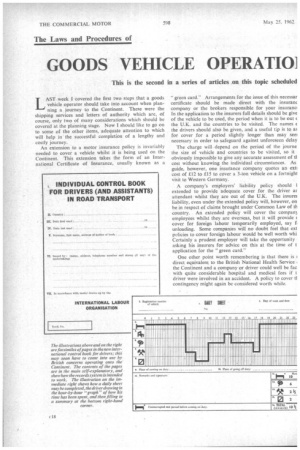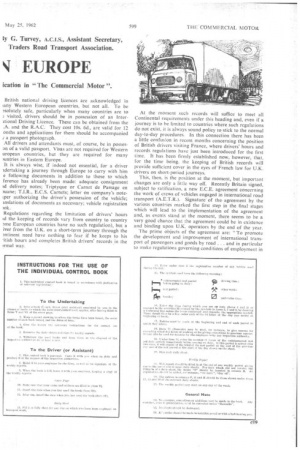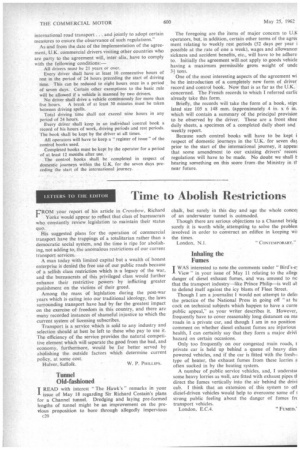GOODS VEHICLE OPERATIO] EUROPE
Page 48

Page 49

Page 50

If you've noticed an error in this article please click here to report it so we can fix it.
This is the second in a series of articles on this topic scheduled
ication in "The Commercial Motor ".
LAST week I covered the first two steps that a goods vehicle operator should take into account when planning a journey to the Continent. These were the shipping services and letters of authority which are, of course, only two of many considerations which should be covered at the planning stage. Now I should like to go on to some of the other items, adequate attention to which will help in the successful completion of a lengthy and costly journey.
An extension to a motor insurance policy is invariably needed to cover a vehicle whilst it is being used on the Continent. This extension takes the form of an International Certificate of Insurance, usually known as a "green card." Arrangements for the issue of this necessar certificate should be made direct with the insuranc company or the brokers responsible for your insuranci In the application to the insurers full details should be give of the vehicle to be used, the period when it is to be out ( the U.K. and the countries to be visited. The names t the drivers should also be given, and a useful tip is to a.1 for cover for a period slightly longer than may seei necessary in order to safeguard against unforeseen delay The charge will depend on the period of the journe the size of vehicle and countries to be visited, so it obviously impossible to give any accurate assessment of tl cost without knowing the individual circumstances. As guide, however, one insurance company quotes an exti cost of i12 to £.15 to cover a 3-ton vehicle on a fortnight visit to Western Germany.
A company's employers' liability policy should I extended to provide adequate cover for the driver at attendant whilst they are out of the U.K. The insurei liability, even under the extended policy will, however, on be in respect of claims brought under Common Law of tF country. An extended policy will cover the compan5 employees whilst they are overseas, but it will provide I cover for foreign labour temporarily employed, say f unloading. Some companies will no doubt feel that ext policies to cover foreign labour would be well worth whi Certainly a prudent employer will take the opportunity asking his insurers for advice on this at the time of t application for the "green card."
One other point worth remembering is that there is direct equivalent to the British National Health Service the Continent and a company or driver could well be fac with quite considerable hospital and medical fees if t driver were involved in an accident. A policy to cover ti contingency might again be considered worth while.
British national driving licences are acknowledged in any Western European countries, but not all. To be nolutely safe, particularly when many countries are to visited, drivers should be in possession of an Interitional Driving-Licence. These can be obtained from the A. and the R.A.C. They cost 10s. 6d., are valid for 12 onths and applications for them should be accompanied a passport photograph.
All drivers and attendants must, of course, be in possesDri of a valid passport. Visas are not required for Western uropean countries, but they are required for many runtries in Eastern Europe.
It is always wise, if indeed not essential, for a driver Klertaking a journey through Europe to carry with him e following documents in addition to those to which ference has already been made: adequate consignment id delivery notes; Triptyque or Carnet de Passage en mane; T.I.R., E.C.S. Carnets; letter on company's noteper authorizing the driver's possession of the vehicle; inslations of documents as necessary; vehicle registration )ok.
Regulations regarding the limitation of drivers' hours id the keeping of records vary from country to country me European countries have no such regulation), but a iver from the U.K. on a short-term journey through the mtinent need have nothing to fear if he keeps to his 'his]] hours and completes British drivers' records in the Irma] way.
At the moment such records will suffice to meet all Continental requirements under this heading and, even if a journey is to be limited to countries where such regulations do not exist, it is always sound policy to stick to the normal day-to-day procedures. In this connection there has been a little confusion in recent months concerning the position of British drivers visiting France, where drivers' hours and records regulations have just been introduced for the first time. It has been firmly established now, however, that, for the time being. the keeping of British records will provide sufficient cover in the eyes of'French law for U.K. drivers on short-period journeys.
This, then, is the position at the moment, but important changes are only a little way off. Recently Britain signed, subject to ratification, a new E.CE. agreement concerning the work of crews of vehicles engaged in international road transport (A.E.T.R.). Signature of the, agreement by the various countries marked the first step in the final stages which will lead to the implementation of the agreement and, as events stand at the moment, there seems to be a very good chance that the agreement could be in existence and binding upon U.K. operators by the end of the year.
The prime objects of the agreement are: "To promote the development and improvement of international transport of passengers and goods by road . .. and in particular to make regulations governing conditions of employment in international road transport . .. and jointly to adopt certain measures to ensure the observance of such regulations."
As and from the date of the implementation of the agreement, U.K. commercial drivers visiting other countries who are party to the agreement will, inter alia, have to comply with the following conditions:— All drivers must be 21 years or over.
Every driver shall have at least 10 consecutive hours of rest in the period of 24 hours preceding the start of driving time. This can be reduced to eight hours once in a period of seven days. Certain other exemptions to the basic rule will be allowed if a vehicle is manned by two drivers.
No driver shall drive a vehicle continuously for more than five hours. A break of at least 30 minutes must be taken between driving spells.
Total driving time shall not exceed nine hours in any period of 24 hours.
Every driver shall keep in an individual control book a record of his hours of work, driving periods and rest periods. The hook shall be kept by the driver at all times.
All operators will have to keep a "register of issue" of the control books used.
Completed books must be kept by the operator for a period of at least 12 months after use.
The control books shall be completed in respect of domestic journeys within the U.K. for the seven days preceding the start of the international journey.
The foregoing are the items of major concern to U.K operators, but, in addition, certain other terms of the agree ment relating to weekly rest periods (52 days per year i possible at the rate of one a week), wages and allowance: sickness and accident benefits, etc., will have to be adhere to. Initially the agreement will not apply to goods vehicle having a maximum permissible gross weight of uncle 31 tons.
One of the most interesting aspects of the agreement wi be the introduction of a completely new form of driver record and control book. Now that is as far as the U.K. concerned. The French records to which I referred earlie already take this form.
Briefly, the records will take the form of a book, stipt lated size 105 x 148 ram. (approximately 4 in. x 6 in. which will contain a summary of the principal provisior to be observed by the driver'. These are a front shee daily sheets, a specimen of a completed daily sheet and weekly report.
Because such control books will have to be kept i respect of domestic journeys in the U.K. for seven da3 prior to the start of the international journey, it appeal that some amendment to our existing drivers' recort regulations will have to be made. No doubt we shall t hearing something on this score from the Ministry in tt near future.












































































































